
Frackers Booted Out of Eastern Europe
A combination of objective reality and strident direct action has seen fracking fade into oblivion in much of Eastern Europe. Good news for the rural areas where much of this would have occurred. […]

A combination of objective reality and strident direct action has seen fracking fade into oblivion in much of Eastern Europe. Good news for the rural areas where much of this would have occurred. […]
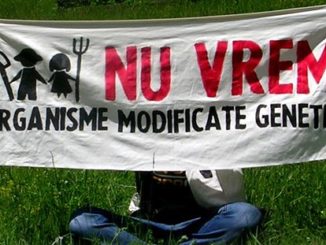
With the GMO free regions event in Berlin on right now, Ramona Duminicioiu assesses GMOs in the EU and Romania
[…]

A group of Welsh hill farmers has successfully challenged a deeply unpopular ten-fold differential in proposed Basic Payment rates for upland. Less than a week before Christmas, the Welsh Assembly stepped back from a judicial review of its November decision to fix Basic Payments (BPS) at EUR 20/hectare above the 400-metre contour, compared to EUR 200/hectare below it. Ad hoc hill farmers’ group Fairness For The Uplands (FFTU) had secured a court hearing into what spokesman Tony Davies told journalists had become a “fiasco.” Farmers’ concerns over how the moorland line was to be fixed had not been understood, according to the FFTU, which advocates a fairer system based on productivity. Working with a landscape that can rise from sea level to 1,000 metres within tens of kilometres, Welsh hill farmers do not live by contour lines, even if it would have suited payment agency staff for them to do so. For the Welsh Assembly, the choice of a contour line avoids endless arguments about how to classify and support agricultural activity or disallow agricultural […]
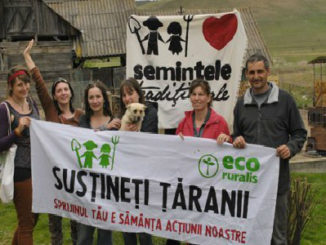
Eco Ruralis take the global local in Romania for peasants and against TTIP. With Laetitia Nourry […]
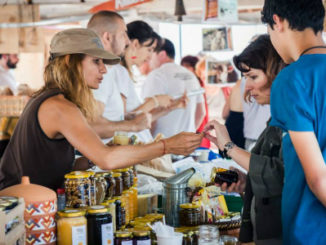
Another way to do food is possible. And its here. Friends of the Earth Europe’s “Eating from the Farm – the social, environmental, and economic benefits of local food systems” show us inspirational examples of where you can shake the hand that feeds you, all around Europe. This new publication explores the many myriad benefits of short food supply chains, and how they function in few countries in the EU. It “features five case studies which illustrate different ways in which communities are finding more sustainable ways to produce and consume food with benefits for all” FOEE say about the publication . They continue “The methods vary, but the outcomes are the same: control of the food system is being taken back by small-scale, sustainable farms and food enterprises from large-scale industrial businesses that dominate the market today putting profit ahead of well being for people and planet.” The milestone of more urban than rural dwellers reached globally as long ago as 2007. This, coupled with a the twin demands of the sustainable use of resources and […]
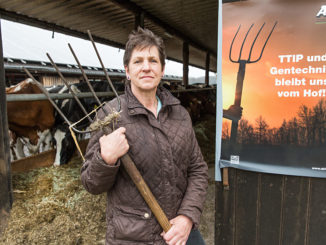
On the 17th April 450 farmers demonstrated in the global day of action across Germany against TTIP (The EU-US free trade agreement) and genetically engineered crops. They marched together under the slogan of ‘TTIP and Gentechnik, bleibt uns vom Hof [TTIP and genetic engineering stay away from our farmers]’. The demonstation, organised by the AbL (Arbeitsgemeinschaft bäuerliche Landwirtschaft), sought to emphasise how the TTIP would threaten the livelihoods of farmers and would pave the way for the introduction of American produced GMOs. Find more information at: www.abl-ev.de
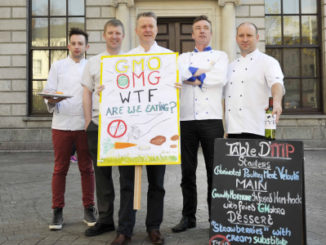
Saturday 18th April was the Global Day of Action for sharing information, raising public awareness and staging demonstrations against TTIP. Seven events were organized in Ireland and over 700 took place around the world, involving a diverse range of civic agencies, social and environmental NGOs and many other interested parties. In Ireland this included chefs, led by the non-profit chefs’ organization Euro-Toques Ireland. In the weeks leading up to it big names including Jamie Oliver and Darina Allen spoke out from the chefs’ corner, voicing their concerns for the future of food and agriculture in the European Union should the TTIP treaty be ratified. “The Transatlantic Trade and Investment Partnership (TTIP) agreement poses a serious threat to the well-regulated Irish and European food industry,” said Darina Allen in a statement from Slow Food Ireland last week. “Who will benefit from this agreement? It will certainly not be consumers, who will see food information further weakened over longer food supply chains, nor will it be the large majority of small-scale producers, serving local markets, who make […]
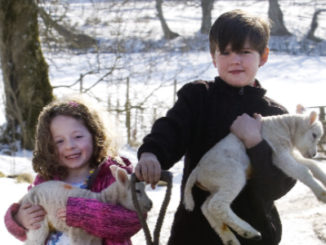
Whitmuir Community Farm, a few miles south of the Scottish capital Edinburgh is selling itself to the local community. Literally. For a couple of years now, Whitmuir Community Benefit Society has been selling shares in the working organic farm, with a view to securing the future of the educational work that already goes on there. “Transferring the land from private ownership to community ownership not only protects the long term future of the farm, but also allows greater collaboration with the educational and science sectors than is currently possible and enables the development of accommodation and teaching facilities on site,” explains Pete Ritchie, director of Nourish Scotland, who is currently farming Whitmuir with his partner, Heather Anderson. The process of selling shares was launched in 2013, with the first share being bought for then five-year-old Maya by her family. The launch event was also attended by the Scottish Parliament’s Cabinet Secretary for Rural Affairs, Food and Environment, Richard Lochhead (pictured below, with Maya). There are now 14 shareholders under the age of 16 and the […]

Guest post by David Cronin What is the real objective of the Trans-Atlantic Trade and Investment Partnership (TTIP)? We can get a good idea from watching a video recorded recently in Brussels. It features Cecilia Malmström, the European commissioner for trade, defending highly controversial plans to usher in a court system whereby corporations could sue against government decisions they do not like. According to Malmström, “companies need to have some sort of protection” against such issues as “nationalisation”. Intentional or not, that statement illustrates how the key negotiators of TTIP are in thrall to a right-wing ideology. The idea that certain economic activities could be nationalised – placed under public ownership – is anathema to them. TTIP would be a legally-binding accord effectively saying that capitalism is the only permissible system in the European Union and the United States. In the same video, Malmström insists she has “no secret agenda”. And to be fair, the Swede has been slightly more transparent than the EU’s previous trade chiefs. The irony is that the modicum of transparency she has […]

Today 14th April is a big TTIP day in Europe. In the Parliament you can follow the debate live here. Here are the amendments being voted on. Politicians of all hues are suggesting amendments. Ag will feature at 15.00 CET. Here is the debate sequence for today: ENVI: Tuesday 14th April, 09:00 AM CULT: Thursday 16th April, 09:00 AM JURI: Thursday 16th April, 10:00 AM AFCO: Thursday 16th April, 10:00 AM PETI: Thursday 16th April, 10:00 AM AGRI Tuesday 14th April, 15:00 PM Also today TTIP-related events 1: Sharon Anglin Treat (Maine Citizen Trade Policy Commission) at 12.30 CET Parliament presentation. Treat will focus on: The EU regulatory cooperation proposal in TTIP; Clues to the US regulatory proposal in TTIP; US experience with domestic regulatory coordination (OIRA) and cost-benefit studies; food democracy at risk – how regulatory cooperation and coherence will promote large scale industrial agriculture, weaken and delay food safety and pesticide protections, jeopardize the precautionary principle and attack the value of subsidiarity. UPDATE: Watch Sharon Treat in this short video from the talk explain […]
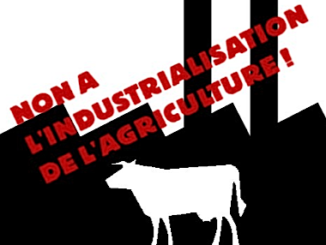
Where would you expect to find a completely automated dairy factory, where 280 cows are milked by four robots overseen by just two staff? The Breton town of Bréhan is home to this French factory farm, one of 27 listed in an online map published by Confédération paysanne (Conf’). The Conf’ has identified some of the most notorious factory-scale units so far in a list that is already extensive, with livestock units holding thousands of finishing cattle and thousands of piglets. One pig unit has applied to expand its herd to 3,000, despite being located in the middle of a Natura 2000 zone with an ecology that is home to flora and fauna of scientific interest. If the project at Loueuse (60) goes ahead, Cooperl will be spreading 5,000 cubic metres of slurry on 400 hectares. The public inquiry went in favour of the pig business Cooperl and the project will receive a final decision from the prefet in June. A factory farm for 4,500 finishing pigs at Heuringhem (62) received planning permission in March […]
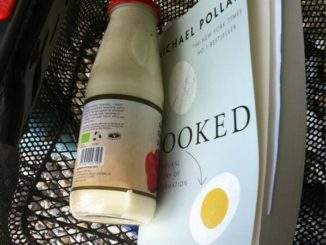
Guest post by Siobhan o Donoghue of Uplift The milk quota system across Europe came to an end on April 1st. Listening to the dominant media and political commentary in Ireland you could be forgiven for thinking that this landmark event heralds the beginning of great things for farming and farmers. In fact the ending of the famous milk quota system just accelerates the race to the bottom for sustainable farming. The deregulation of milk production risks destabilising the market. Farmers will find it harder to secure a fair price for milk as corporate businesses become more powerful and gain more control of the market. Smaller farming families will find it more difficult to stay in business and out of debt because of inevitable fluctuations in milk prices. The Irish government’s Food Harvest 2020 Strategy predicts that milk production will increase by 50% with the removal of milk quotas. Agriculture is Ireland’s largest contributor to overall Greenhouse Gas (GHG) emissions, accounting for over 30% of our total GHG emissions. By 2020, emissions from the agriculture […]
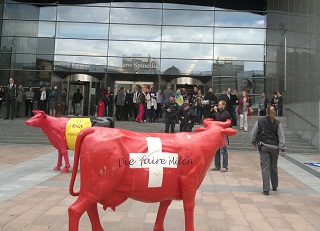
After 1 April, the European milk market will have no operating safety net. For the dairy farmers in Europe this means more, worse crises and falling prices in future. Many of them will have to give up milk production completely; regions throughout Europe will be affected. As milk production will no longer be possible in many regions, consumers will have fewer possibilities in future for buying regional products. The diversity of dairy products will vanish. That is why the dairy farmers are demanding that the European politicians put in place a working crisis system enabling crises to be predicted and prevented. The “Market Responsibility Programme” (MRP) could be the solution. What can dairy farmers expect after the beginning of April? On 31 March 2015, the milk quotas that have operated for more than 30 years will come to an end – the system for the time after that evinces considerable deficiencies. It is to be assumed that dairy farmers in many EU countries will initially step up production. Demand will not be able to absorb […]
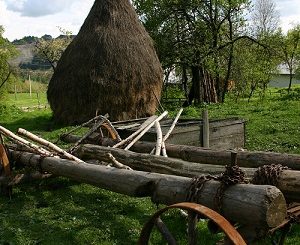
According to recent figures released by Eurostat, Romanian agriculture is highly unbalanced. That is not the big surprise. In the last 20 years the country’s agricultural landscape was in a continuous transformation; agrarian reforms without a long term vision, real estate and agribusiness “cowboys” from all over the world speculating on low prices, productions focusing mostly on export commodities…all in a country of peasants versus their institutional neighbours. The surprise lies in how different stakeholders interpret these figures. Let’s have a look. According to the EU analysis, Romania is the 8th agricultural power of Europe and for the year of 2014 has an agricultural production estimated to 15.5 billion Euro (1160 Euro/hectare). Poland was the only other ex-communist country which outranked Romania having a 22.5 billion Euro (1660 Euro/hectar) production. The top ranks go to France, with its 70.5 billion Euro and Germany – 51 billion Euro production. Where is the great unbalance? Crop production amounts for 73% of the total, 26% being attributed to animal farming and only 1% represents agricultural services. On the […]
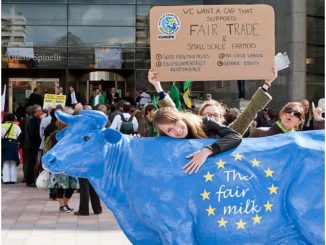
By Laetitia Nourry, Eco Ruralis intern on Food Chains Campaign 30 years after its setting up, the milk quota system is coming to its end. Europe is returning to unlimited production of milk where the benefits go to industrial farming. Another stab for the slowly disappearing peasant farmer. Milk quotas were set up in 1984 by the Common Agricultural Policy, to regulate the supply and demand and avoid prices collapse. So why lift them now? The reason is for economic. As milk consumption is increasing, especially in Asia (the demand of milk should double by 2022), the European Union definitely wants to keep its first place as milk exporter to the world. To reach this goal, one solution proposed by the EU leaders says that “farmers should be more aware of the market signal“. In other words, produce more milk, again and again, at the cheapest price. Hyper-production, exports, economic growth…but what is the price ? The end of quotas will indeed enrich big producers. Industrial farms will be able to produce milk in impressive […]
Agricultural and Rural Convention